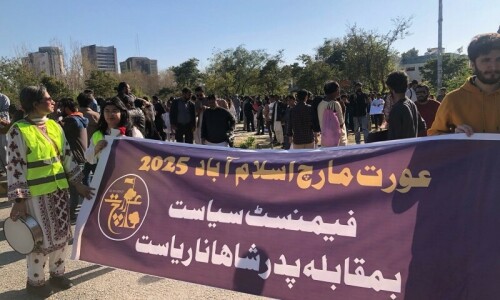LAHORE: The Lahore High Court on Friday ordered the provincial government to immediately seal super stores still using plastic bags if they did not furnish affidavits to comply with the ban in seven days.
Justice Shahid Karim was hearing a public interest petition, when Additional Advocate General Anees Hashmi submitted a report on behalf of the Environment Protection Agency (EPA).
He stated that bakeries including Cakes & Bakes, Gourmet, Malmo and government utility stores had not abandoned the plastic bags as ordered by the court.
However, he said, Al-Fateh store and Shezan Bakers submitted affidavits to quit using plastic bags from March 4.
Justice Karim directed the government to seal the bakeries and all such stores if they did not give affidavits to comply with the ban within seven days.
The law officer said the consumers at the bakeries had been complaining about unavailability of plastic bags. The consumers needed these bags to carry eggs, he said.
Petitioner’s counsel Abuzar Salman Niazi pointed out that at stores in Cantonment areas the buyers brought rag bags with them.
Justice Karim observed that the majority of consumers was unaware of the hazards of plastic bags, but the court would eliminate all environmental hazardous items.
“The citizens need to change their attitude,” the judge said.
The judge also expressed displeasure over the sale of drinking water in plastic bottles and issued notices to all water manufacturing companies, including Nestle, Pepsi and Coca Cola.
The judge noted with regret that the whole world already gave up selling water in plastic bottles and switched to glass.
Further hearing was adjourned till March 6.
On Feb 7 last, the judge had given a two-week time to the departmental stores to shift to alternate modes.
The petitioner contended that plastic products caused harmful effects on human health and environment by the use of polythene bags and styrofoam products (plastic straws, cups, spoons, plates, food trays and other related disposable material).
He said polythene bags and styrofoam products were single use plastics which took thousands of years to decompose and they had been causing havoc in various areas of Punjab and were damaging the sewerage system of cities, spreading epidemics, polluting soil, causing water pollution and endangering aquatic life.
He argued that the use of 15 microns thickness was an environmental disaster and even in the Third World countries the minimum permissible thickness was 50 microns (which was relatively less hazardous for environment).
Published in Dawn, February 29th, 2020












































